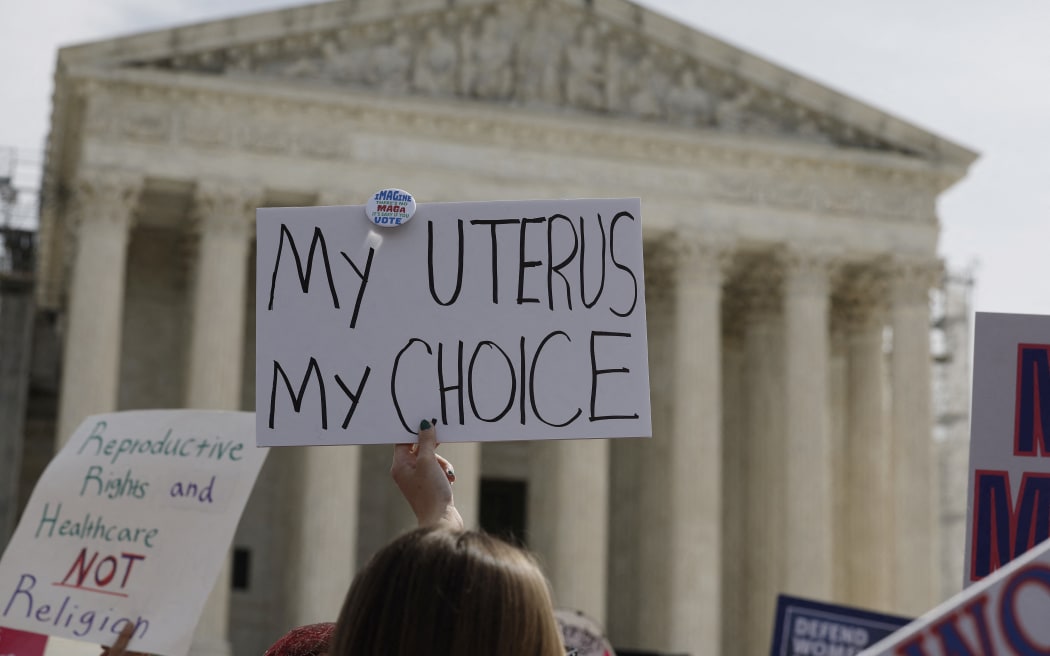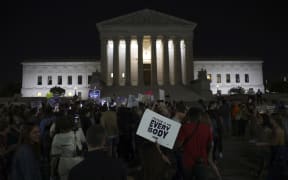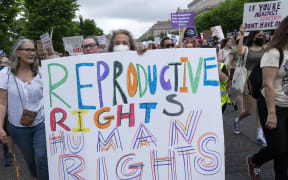
Demonstrators participate in a abortion-rights rally outside the Supreme Court on 26 March 2024 in Washington, DC (file photo). Photo: Anna Moneymaker / Getty Images via AFP
By Brendan Pierson and Tom Hals, Reuters
The US state of Florida's top court has cleared the way for a Republican-backed law banning abortion after six weeks of pregnancy to take effect, but also approved an initiative to let voters decide whether to amend the state's constitution to establish a right to an abortion.
In a pair of rulings on Tuesday (NZT), the Florida Supreme Court upheld an existing law that banned abortion after 15 weeks, and by doing so, cleared the way for a six-week ban to take effect.
However, the court also dismissed an effort by the state's Republican attorney general to prevent an initiative from appearing on the November ballot, giving voters the chance to decide whether there should be a right to an abortion.
"We decline to encroach on the prerogative to amend their constitution that the people have reserved to themselves," the court said in one of the rulings.
Abortion is illegal after 15 weeks in Florida under a law signed by Governor Ron DeSantis in 2022, two months before the US Supreme Court overturned its landmark 1973 Roe v Wade ruling that had legalised the procedure nationwide.
DeSantis in April 2023 signed an even stricter ban passed by the Republican-controlled state legislature starting at six weeks of pregnancy. That measure included "trigger" language that enacted the near-total ban one month after the state Supreme Court affirmed the earlier 15-month ban. At six weeks, many women do not yet know they are pregnant.
A group of Florida abortion providers including affiliates of Planned Parenthood had filed a lawsuit in 2022 challenging the 15-week ban, saying the measure violates the state's constitution.
On the 5 November ballot
Abortion access is now almost non-existent in Southern US states, with most having imposed sweeping Republican-backed restrictions.
That could change on 5 November, when the Florida voters will decide on the abortion ballot initiative alongside the presidential election between Democrat Joe Biden and his Republican challenger, former president Donald Trump.
Democrats have credited the abortion debate for driving supporters to the voting booths in 2022, when the party did better than expected in Congressional elections.
"This is our chance to engage in direct democracy to stop these unpopular and harmful policies," said Lauren Brenzel, the campaign director for Yes on 4, the umbrella group backing the ballot initiative.
Liberty Counsel, a conservative legal group that opposed the ballot initiative, posted on social media platform X that it was "incredibly disappointed" with the court's ruling. "We are hopeful Floridians will side with LIFE in November!"
The constitutional amendment proposal's backers in January secured the required number of signatures to put it on the ballot. It would ban laws that "prohibit, penalise, delay or restrict abortion before viability or when necessary to protect the patient's health, as determined by the patient's healthcare provider".
On Monday, the Florida Supreme Court said it was departing from a 1989 decision that found the state constitution's right to privacy included a right to abortion. At that time, a majority of the high court's justices had been appointed by Democratic governors. The court now is viewed as one of the most conservative in the United States.
All seven of its current justices were appointed by Republican governors, including five by DeSantis, an outspoken abortion opponent who mounted an unsuccessful run for the Republican presidential nomination.
Republican state Attorney General Ashley Moody sued Floridians Protecting Freedom, the abortion rights group sponsoring the ballot measure, and had argued that the proposal was impermissibly vague and misleading.
The Florida Supreme Court rejected Moody's arguments, writing that "the broad sweep of this proposed amendment is obvious in the language of the summary. Denying this requires a flight from reality."
Moody said in a statement should would respect the court's decision.
Abortion rights advocates have sought to put the matter directly to voters. Abortion rights measures have prevailed everywhere they have been on the ballot since the Supreme Court's decision.
Constitutional amendments in Florida must pass with at least 60 percent of the vote, a larger percentage of the vote than any statewide abortion measure has yet won.
Last November, voters approved by a margin of 57 percent to 43 percent a constitutional amendment enshrining abortion rights in Ohio, a state that in the 2020 election voted for Trump by a margin of 8 percentage points over Democrat Joe Biden in the presidential election. In 2020, Trump topped Biden by 3 percentage points in Florida.
The Florida Supreme Court on Monday also rejected a bid by the attorney general to prevent a ballot initiative to legalise recreational marijuana use by adults.
This story was originally published by Reuters.






